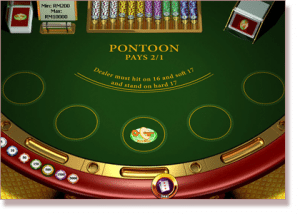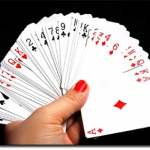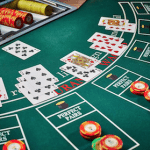Pontoon is an Australian blackjack variant and an ideal game for gamblers looking for an alternative experience, with some favourable rule differences, and some of the lowest house edges on offer.
 Pontoon actually comes in two different types, both of which originally derived from another American blackjack variant called Spanish 21. The first version of Pontoon is played in Britain and the UK, and is very similar to conventional American blackjack. The second version of Pontoon is played in Australian, Malaysian and Singaporean casinos and is significantly different. It is known by several different names across several different casinos: Treasury 21 in Brisbane’s Treasury Casino, Paradise Pontoon in Cairns’ Reef Casino, Jupiter 21 in Gold Coast’s Jupiter Casino and Federal Pontoon in Tasmania.
Pontoon actually comes in two different types, both of which originally derived from another American blackjack variant called Spanish 21. The first version of Pontoon is played in Britain and the UK, and is very similar to conventional American blackjack. The second version of Pontoon is played in Australian, Malaysian and Singaporean casinos and is significantly different. It is known by several different names across several different casinos: Treasury 21 in Brisbane’s Treasury Casino, Paradise Pontoon in Cairns’ Reef Casino, Jupiter 21 in Gold Coast’s Jupiter Casino and Federal Pontoon in Tasmania.
While both variants of Pontoon have similar rules to Spanish 21, the Australian version of Pontoon has proven to be far more popular than both its American inspiration and British counterpart. For clarity, this article will focus on the Australian variant.
Websites to play Pontoon
The Objective
The aim of Pontoon is to receive cards totalled at a greater value than the dealer, without exceeding 21 points; otherwise you bust and lose. If your hand contains an Ace and a 10-valued card, that is considered Pontoon, and in most games, pays either 3:2 or 2:1. In essence, Pontoon is still similar to blackjack, and is played on the same table as traditional blackjack and Spanish 21. However, it has a few notable rule and term differences which distinguish it from its origins:
Term Differences:
- Hitting 21 is called Pontoon, rather than blackjack.
- A hit is referred to as a twist.
- A stand is called a stick.
- A buy refers to doubling the bet, and you can still twist afterwards (not to be confused with doubling down).
- Early surrender is available and known as double down rescue./li>
Fixed Rules Differences:
- The dealer has no hole card (NHC), which is akin to many of the blackjack games in Australia and Europe. This means players cannot determine whether the dealer will draw a natural Pontoon until all players have acted and the dealer draws a second card.
- Pontoon (21) hands thus will win immediately (always beating the dealer’s Pontoon).
- The game is played with either four decks from a continuous shuffling machine, or six to eight decks from a shoe. All Tens (Ten of Hearts, Diamonds, Spades & Clubs) are removed from the decks.
- You can split up to a maximum of two times, depending on the casino.
- You can only double down on a hand which is totalling nine, 10 or 11.
- The Ace in any hand which has not been doubled must always count as one, rather than one or 11. Thus, if doubling on a soft-18 (say an Ace and a Seven), you are actually doubling on eight, which is highly inadvisable.
- Double down rescue (early surrender) is available only after a player has doubled down; you must forfeit an amount equal to your original bet.
- Late surrender is offered when the dealer’s up-card is a Ten or an Ace; but if the dealer hits blackjack, you still lose your entire bet. Also, you miss the chance to draw to 21 and win immediately. Late surrender is thus not such a valuable option.
- The dealer must always hit on a soft-17, a rule which favours the house.
No Hole Card Rules
As the dealer does not have a hole card, it is possible for players to split/double and if the dealer draws Pontoon, lose multiple bets. Most games will offer compensation in the form of the following rules. Because the following rules are unique to Australian versions of Pontoon, make sure to familiarise yourself with them as they are not present in conventional blackjack.
Note: These rules are applied after the dealer has removed all busted bets, all winnings from hands totalling 21, and all forfeited hands.
- OBBO (Original and Busted Bets Only): If the dealer draws Pontoon, you lose any hands you have busted, plus one bet from each split hand remaining. If you have not split, you lose just the one bet. No penalty is taken from any double downs.
- BB+1 (Busted Bets Plus One): If the dealer draws to Pontoon, you lose any hands you have busted in addition to an amount equal to your initial wager, even if you have multiple split hands in one box.
- ENHC (European No Hole Card): If the dealer draws Pontoon, the player loses every wager on the table. This is the worst rule as it offers no compensation on a dealer natural.
BB+1 is the more common of the three rules in Australian Pontoon.
State Variations of Pontoon
Pontoon has a large number of fixed rules and conventions, but its prominence all over Australia has lead to a certain level of minor differences introduced by each state’s casinos, as detailed below:
Federal Pontoon
Played in Tasmania in the Country Club Casino and Wrest Point Casino, the name is derived from the casino owners, the Federal Group. It is playable only in the public section of Wrest Point Casino, and not in the VIP area.
- Eight decks, dealt from a shoe.
- BB+1 (Busted Bet’s Plus One).
- Splitting up to three times allowed, with the exception of Aces.
Jupiter’s 21
Played in Queensland at Jupiter’s Casino, which is why it is named Jupiter’s 21.
- Four decks used, dealt by a continuous shuffling machine.
- BB+1 (Busted Bet’s Plus One).
- No re-splits permitted.
Treasury 21
Played in Queensland at the Treasury Casino.
- Six decks, dealt by a shoe in VIP area, and a continuous shuffling machine in the public area.
- BB+1 (Busted Bet’s Plus One).
- No re-splits are permitted.
Payouts
Part of what makes Pontoon very appealing as its own unique game to the average gambler is its massive bonuses. The game often awards special payouts based on the number of cards in your hand, as well as certain special combinations.
- If you reach 21 with a five-card hand, the payout is 3 to 2.
- If you reach 21 with a six-card hand, the payout is 2 to 1.
- If you reach 21 with a seven-card hand or more, the payout is 3 to 1.
- If you reach 21 with a Six, Seven, Eight combination, or with three Sevens, the payout is 3 to 2 for mixed suits, 2 to 1 for same suit, and 3 to 1 for Spades.
- If you reach 21 with three Sevens and the dealer’s up-card is also a Seven, the payout is $1000 for bets of $5 to $24, and $5000 for any bets made over $25, while all other players on the table receive an ‘envy bonus’ of $50.
- If you win the game with any other hand combination, it is an even-money payout (1:1).
Note: These aforementioned bonuses do not pay after doubling down; if you manage to draw three Sevens with the dealer’s face up card of Seven, the bonus does not pay out for both doubling or splitting.
House Edge
Pontoon offers some of the best house edge for the player of any blackjack variant game. While the removal of the 10-valued cards out of the 52-card Spanish decks favours the house, the bonus payouts, flexibility in surrendering, and the fact a player’s hand of 21 (Pontoon, or any other hand totalling 21) is paid out immediately, regardless of what the dealer has, makes the game significantly advantageous to the player.
Why Play Pontoon over Standard Blackjack?
Pontoon is a thoroughly enjoyable variation of blackjack, and is great if you desire a slightly different experience. But there is more reason to choose Pontoon over blackjack than aesthetics and slight name changes: the fact the game is played with no hole cards, where the dealer draws his/her second card after the end of all player turns, means we can draw Pontoon and win automatically, without the fear of a push or a loss, like in certain other variations of blackjack.






